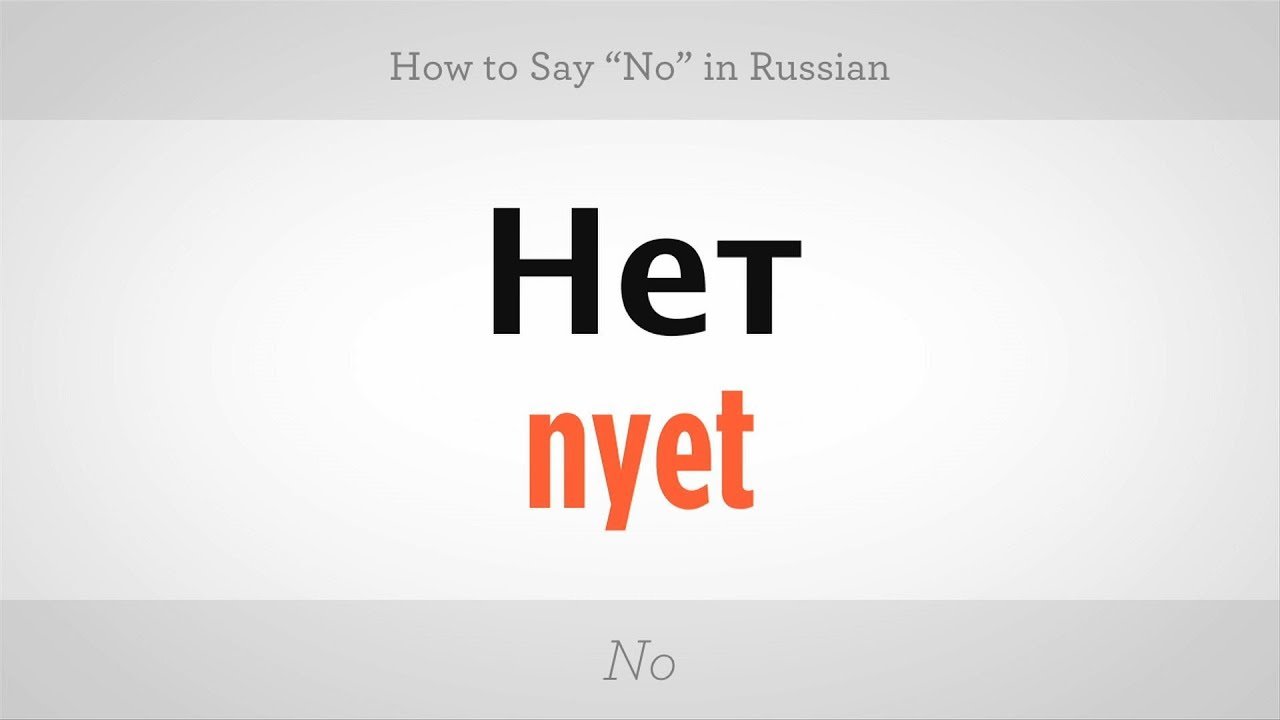Wondering how to say “no” in Russian? The answer lies in the simple yet powerful word “нет” (pronounced as “nyet”). This tiny word holds a lot of weight in the Russian language, conveying a strong sense of refusal or denial. Let’s dive deeper into the nuances and usage of “no in Russian,” exploring its impact and significance in conversations and everyday interactions. Join me on this linguistic journey as we unravel the layers of this essential word in the Russian vocabulary.
No in Russian: Understanding the Negation in the Russian Language
Russian is a fascinating language with its own set of grammar rules, vocabulary, and nuances that make it unique. One crucial aspect of any language is how negation is expressed. In this article, we delve into the concept of “no” in the Russian language, exploring its various forms, usage, and exceptions.
The Basics of Negation in Russian
Negation in Russian is primarily expressed through the use of the word “не” (pronounced like “nye”). This word is placed in front of the verb to negate the action. However, the placement of “не” can vary depending on the sentence structure and verb conjugation.
Verbs in Russian can be negated in the following ways:
- Placing “не” before imperfective verbs: Я не говорю (I do not speak).
- Placing “не” after perfective verbs: Я почистил не зубы (I did not brush my teeth).
Common Negation Words and Phrases
In addition to using “не” to negate verbs, Russian also employs other words and phrases for negation, each serving a specific purpose and context. Here are some common negation words and phrases in Russian:
- Никто (Nikto) – Nobody
- Ничего (Nichego) – Nothing
- Никогда (Nikogda) – Never
- Нельзя (Nel’zya) – It is impossible / It is forbidden
These words and phrases play a crucial role in expressing negation with a more nuanced meaning.
Double Negatives in Russian
Unlike in English, where double negatives cancel each other out, Russian allows the use of double negatives for emphasis without creating a positive meaning. This feature is common in informal speech and certain dialects. Here is an example:
“Я никогда ничего не делаю” translates to “I never do anything” in English, where both “никогда” (never) and “ничего” (nothing) are used for emphasis.
Exceptions and Special Cases
While the basic rules of negation in Russian are straightforward, there are exceptions and special cases that learners should be aware of:
- Verbs of perception: When negating verbs of perception like “видеть” (to see) or “слышать” (to hear), Russian uses the genitive case instead of the accusative case. For example: Я не вижу никого (I do not see anyone).
- Expressions with “нет”: The word “нет” (no) is used as a standalone negation in responses. For example: – Ты что-то хочешь? – Нет, спасибо (Do you want something? – No, thank you).
Understanding these exceptions will help learners navigate the complexities of negation in Russian more effectively.
Polite Negation and Softeners
In Russian culture, politeness is highly valued, and this is reflected in the language as well. When expressing negation in formal or polite contexts, softer language forms are often used to mitigate the directness of the negation. Here are some examples:
- Извините, но я не согласен с вами (Excuse me, but I do not agree with you).
- Может быть, я неправильно понял, но… (Perhaps I misunderstood, but…).
- Я не уверен, что это возможно (I am not sure if that is possible).
These phrases help maintain a respectful tone while expressing disagreement or negation.
Idiomatic Expressions with “No” in Russian
Russian, like any language, has its share of idiomatic expressions that involve the concept of “no.” These expressions often carry a figurative or metaphorical meaning and may not directly translate to English equivalents. Here are some examples:
- Не всё то золото, что блестит (All that glitters is not gold) – A proverbial expression cautioning against appearances.
- Не иметь ни малейшего понятия (To not have the faintest idea) – Used to indicate a complete lack of knowledge on a subject.
These idiomatic expressions add richness and depth to the Russian language and provide insight into the culture and worldview of native speakers.
In conclusion, mastering the nuances of negation in Russian is essential for developing fluency and understanding in the language. By grasping the different forms of negation, exceptions, and idiomatic expressions, learners can communicate effectively and navigate various social contexts with confidence. Embracing the intricacies of “no” in Russian opens up a world of linguistic and cultural exploration.
How to say "No" in Russian
Frequently Asked Questions
How do you say “no” in Russian?
In Russian, “no” is translated as “нет” (pronounced as “nyet”).
Are there different ways to express “no” in Russian?
While “нет” is the standard way to say “no” in Russian, there are also informal variations like “нету” (nyetu) or “не-а” (nye-a).
Can “нет” be used in different contexts in Russian?
Yes, “нет” is versatile and can be used to deny, refuse, or give a negative response in various situations.
Is the pronunciation of “нет” difficult for non-Russian speakers?
The pronunciation of “нет” may be challenging for non-Russian speakers initially, but with practice, it can be mastered effectively.
How important is it to know how to say “no” in Russian?
Understanding how to say “no” in Russian is crucial for effective communication, especially in situations where clarity and directness are needed.
Are there cultural nuances associated with using “нет” in Russian conversations?
In Russian culture, the use of “нет” can be perceived as straightforward and assertive, reflecting the direct communication style valued in many interpersonal interactions.
Final Thoughts
In Russian, “no” serves as a simple yet essential word in communication. Its direct translation may seem straightforward, but its nuances and various uses add depth to conversations. Whether expressing disagreement or setting boundaries, “no in Russian” plays a crucial role in clear and effective communication. Understanding the context and cultural significance of this word can enhance language proficiency and foster meaningful connections. Embracing the versatility of “no” in Russian opens up opportunities for authentic dialogue and mutual understanding in everyday interactions.




